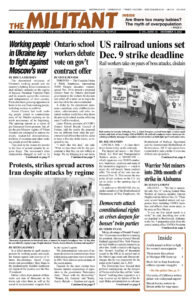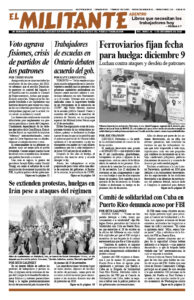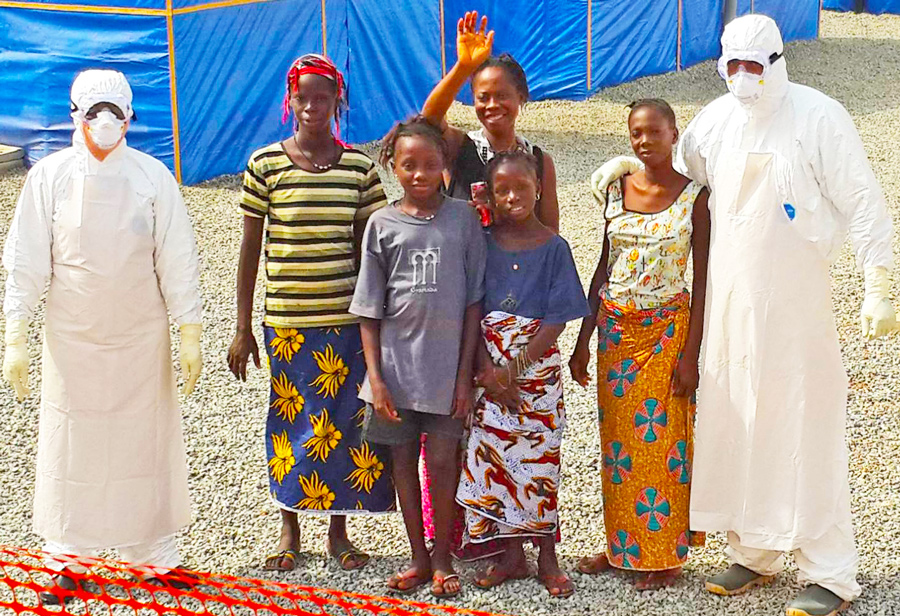Red Zone: Cuba and the Battle Against Ebola in West Africa by Enrique Ubieta is one of Pathfinder’s Books of the Month for November. Ubieta has written about the work of Cuba’s internationalist doctors and nurses in some of the remote areas of Central and Latin America. Here he tells how Cuba’s revolutionary government responded to the call for help after the 2014 outbreak of the deadly Ebola virus in West Africa by sending 256 medical volunteers. Their courageous and hands-on help for thousands stood out and by 2015 the epidemic had been largely eliminated. The excerpt is from the preface. Copyright © 2019 by Pathfinder Press. Reprinted by permission.
MARY-ALICE WATERS
Red Zone: Cuba and the Battle Against Ebola in West Africa is not a book about doctors, epidemics, or medical care, as central as those topics are to the remarkable account you are about to read. First and foremost, the book is “about the solidarity and internationalism that are at the heart of the Cuban Revolution,” as author Enrique Ubieta told the audience at its launching in Havana in February 2016.
In August and September 2014, the World Health Organization and the governments of three West African countries, Liberia, Sierra Leone, and Guinea, issued international calls for help in combating the largest epidemic on record of the deadly Ebola virus. In contrast to the meager and callously self-serving response of capitalist powers, especially the United States, France, and the United Kingdom, Cuba’s revolutionary socialist government acted rapidly.
Within three days of a call to Cuban president Raúl Castro from Ban Ki-moon, secretary-general of the United Nations, more than 12,000 Cuban medical professionals had volunteered, many with experience responding to epidemics and disasters from Haiti to Pakistan to Central America. Of those volunteers, 256 Cuban doctors, nurses, and health care technicians were selected and trained for the mission.
Eight months later, when the last member of the Cuban medical brigade returned home in May 2015, the Ebola epidemic in West Africa had been virtually eradicated.
Ubieta’s firsthand reporting of this fight [is] told largely through accounts by the Cuban participants themselves. …
The volunteers were given intensive training in handling the highly lethal Ebola virus at Cuba’s world-famous Pedro Kourí Institute of Tropical Medicine. The first teams were on their way to the crisis areas in a matter of weeks.
The small island nation of Cuba provided what was most needed and what no other country even tried to deliver: hundreds of doctors, nurses, technicians, and public health specialists on the ground, caring for thousands of desperately ill human beings and their families and communities traumatized by the killer disease.
For the Cuban people and their communist leadership, such a response was nothing new. It was simply one more example of the political course that began with the January 1959 triumph of a revolution that brought to power a government representing working people. A government of, by, and for the humble, as they often describe it. That course — at home and abroad — is one of solidarity, not charity. From Asia and Africa, to Latin America and the Caribbean, they have shared in the hardships and struggles of others seeking national sovereignty and independence.
To give but one example, in the very first years of the revolutionary transformation of Cuba, the new government sent not only weapons but also doctors to aid the embattled National Liberation Front of Algeria fighting for independence from France. And on the ships returning to the island, Cubans brought war orphans and wounded combatants for medical care and education.
Sending doctors to Algeria in the early 1960s “was like a beggar offering his help,” said Cuba’s then Minister of Public Health José Ramón Machado Ventura some thirty years later. “But we knew the Algerian people needed it even more than we did and that they deserved it.” No words better capture the internationalism of the Cuban Revolution. …
Red Zone also provides a compelling refutation of the US government’s slanders against Cuba’s internationalist medical cooperation.
Precisely because the example of this cooperation is so powerful and so welcomed by working people around the world, Washington has intensified efforts to peddle the lie that Cuban doctors, nurses, and medical technicians who volunteer for these missions are victims of “exploitative and coercive labor practices,” “human tracking,” even “modern slavery!” …
Washington’s slanderous campaign is simply another front in the six-decade-long economic war by US Democratic and Republican administrations alike aimed at isolating and economically strangling the Cuban people. …
Fidel Castro, historic leader of the Cuban Revolution, [said] at the opening of the Ebola mission in October 2014: “The medical personnel who will go anywhere to save lives, even at risk of losing their own, are the greatest example of solidarity a human being can offer, above all because they aren’t motivated by material interest.”
The discipline, courage, sense of humor, and joy of these Cuban volunteers comes through time and again in these pages. The political course and moral values their actions embody are an expression of the social relations only a truly socialist revolution can produce. They register the economic, social, and political conquests working people in Cuba have made since they freed their country from US imperialist domination and took power out of the hands of domestic and foreign capitalists and plantation landowners.
Many have asked, “Why did no other country in the world respond to the Ebola epidemic the way Cuba did? Can’t Cuba’s medical system and internationalist missions be emulated by other countries?” The answer is no secret. Cuba’s proletarian internationalism is the product of a socialist revolution. It cannot be grafted onto other nations, nor reproduced by men and women who have not been transformed by a similar revolutionary class struggle.


